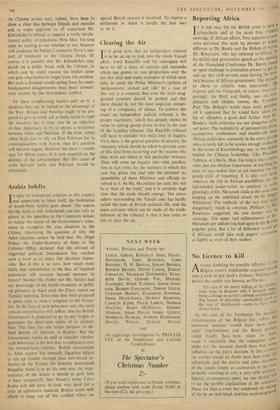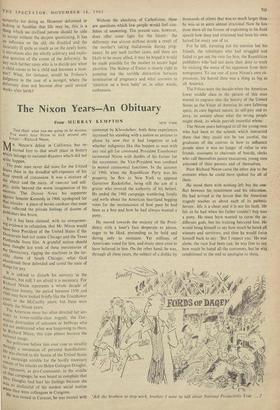No Licence to Kill
AtstyoNE doubting the possible influence of the Belgian court's thalidomide acquittal should take a look at last week's Tribune. Writing even before the verdict was known, so Flavius:
The case of the mercy killing of the thalido-
mide baby in Belgium will, I fervently hope, bring a change in society's attitude to euthanasia. The horror of deformity‚ÄĒparticularly cruel ni the ease of thalidomide‚ÄĒseems to have bee¬į driven home. In the case of the k'andeputs the peculiar circumstances of the Belgian law, wh:re the minimum sentence would have been three years' imprisonment and the Royal Pord¬įr,i could hardly have been taken as react,
in
made it inevitable that the widespread WI' pathy for the accused should have had sortie influence on the jury's decision. In this tn infanticide, and the doctor and other members of the family simply as accessories to the fact, probably resulting in only a very mild sentence.i Special circumstances apart, no one should. fail to see the terrible implications of the acquitt.111'
coi the mother would no doubt have been tried for These are that a court has condoned the taking, of life by an individual, and has received gene"
sYmpathy for doing so. However deformed or lacking in faculties that life may be, this is a flung which no civilised person should be able to accept without the deepest questioning. It has n influence on the old, the disabled and the incurably ill quite as much as on the newly born: it introduces also the wholly arbitrary and explo- sive question of the extent of the deformity. In any such further cases who is to decide just when a child ceases to be a child and becomes a mon- ster? What, for instance, would be Tribune's Judgment in the case of a mongol, where the deformity does not become clear until several Weeks after birth?
Without the absolutes of Catholicism, these are questions which few people would feel con- fident of answering. The present case, however, does offer some light for the future: the deformity was almost without doubt a result of the mother's taking thalidomide during preg- nancy. In any such further cases, and there are likely to be many allied, it may be hoped it would be made possible for the mother to secure legal abortion. The Bishop of Exeter is clearly right in pointing out the terrible distinction between termination of pregnancy and what amounts to `abortion on a born baby' or, in other words, euthanasia.







































 Previous page
Previous page